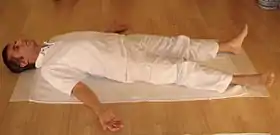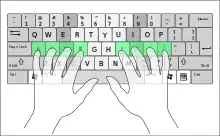Resting position
A resting position or rest position is a default human position or pose assumed (typically deliberately) when a person is not engaged in an activity that demands some other pose, or between poses.
General rest positions
Common resting positions of the body include kneeling, leaning, lying, sitting, and squatting. In microgravity, the relaxed human body naturally assumes neutral body posture.[1]
Rest positions in specific activities



A number of disciplines specify particular resting positions, with various purposes.
Body
Ballet incorporates several resting poses, including a neutral pose described by Cesare Negri and Jacob de Gheyn II with the feet at 45 degrees, back strait, and chin erect.[2] Neoclassical ballet includes a rest or "preparatory" position called "B plus" (possibly named for George Balanchine), also called attitude a terre, in which the standing leg is straight, and the back leg curved with the toe pointed.[3]
Military parade discipline includes standing rest positions, generally assumed following a command of "At ease", "Stand easy", or "Relax".[4][5]
Some forms of yoga incorporate the Shavasana or "Corpse Pose", a rest position used for wakeful relaxation and meditation, often at the end of a session.[6]
Hands and arms
Gun safety rules generally specify that the trigger finger should not rest on the trigger when not firing, but alongside the trigger guard.[7]
In various sign languages, rest positions may be used to convey grammatical meaning.[8]
In touch typing, the home row is a rest position for the hands, placing all the standard keys within easy reach.[9]
References
- "NASA Standards Inform Comfortable Car Seats". NASA. Retrieved 28 May 2015.
- Gilman, Sander L. (February 15, 2018). Stand Up Straight!: A History of Posture. Chapter 5: Dance and the Social Taming of Posture: Reaktion Books. ISBN 9781780239644. Retrieved 18 September 2019.CS1 maint: location (link)
- Minden, Gaynor. "Terms & Positions". Dancer.com. Retrieved 18 September 2019.
- Powers, Rod (September 17, 2018). "Individual Drill Commands: How to Execute Drill Commands". Retrieved 18 September 2019.
- "Understanding Stationary Drill". Military.com. Retrieved 18 September 2019.
- "The History Behind Savasana". Boston Yoga. 6 October 2012. Retrieved 7 March 2017.
- Ayoob, Massad (January–February 2007). "The subtleties of safe firearms handling". Backwoods Home Magazine. Retrieved December 22, 2015.
- Lackner, Andrea (June 28, 2017). "Sign language has grammar—and it goes way beyond what you do with your hands". Quartz. Retrieved 9 September 2019.
- "Home row". Dictionary,com. Retrieved 11 September 2019.
